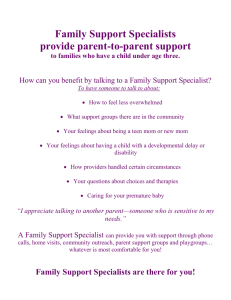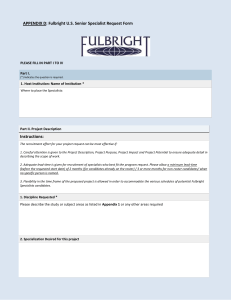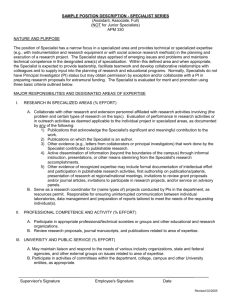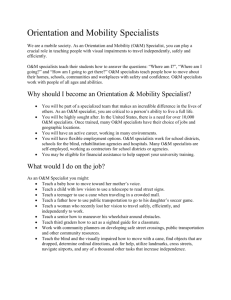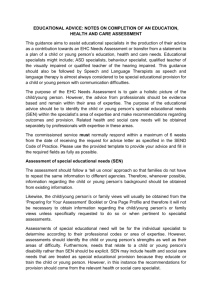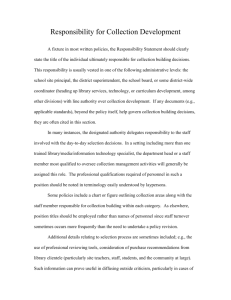Asia-Pacific Economic Cooperation - APEC
advertisement
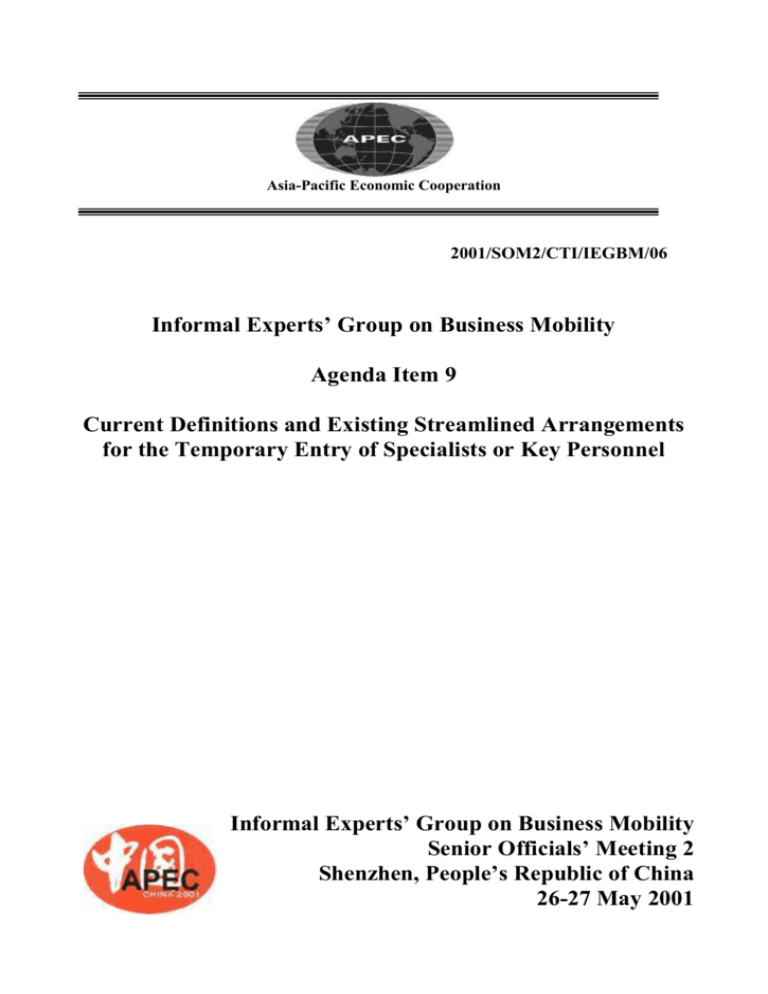
Asia-Pacific Economic Cooperation 2001/SOM2/CTI/IEGBM/06 Informal Experts’ Group on Business Mobility Agenda Item 9 Current Definitions and Existing Streamlined Arrangements for the Temporary Entry of Specialists or Key Personnel Informal Experts’ Group on Business Mobility Senior Officials’ Meeting 2 Shenzhen, People’s Republic of China 26-27 May 2001 SPECIALISTS OR KEY PERSONNEL DEFINITIONS AND EXISTING STREAMLINED ARRANGEMENTS FOR THE TEMPORARY ENTRY OF WORKERS WHO ARE SPECIALISTS OR KEY PERSONNEL. Introduction: At the first Business Mobility meeting of 2001 in February, members reviewed the results of the survey on streamlined arrangements for specialists and non intracompany transferees. It was noted that a common definition of specialists was unlikely given the evolving composition of this group as a result of expanding/globalizing economies and the changing needs of the labour market. It was suggested that given convergence on a definition was problematic, individual economies should adhere to their own definitions but make them widely known through, for example, such vehicles as the APEC Travel Handbook on the Internet. As a result of the discussion, it was agreed that Canada would compile all the available economy definitions of the specialist/non-inter company transferee category and associated processing arrangements. Bracketed notes in bold typeface indicate that more information is requested. It is proposed that the BMG review the compilation below with the aim of deciding on its possible inclusion in some form in the APEC Travel Handbook. In addition, economies who have yet to provide information on this category of workers, are encouraged to do so. Australia: Definition: Australia includes specialists along with managers and executives which are occupations normally assessed as “key activity”. These occupations are essential to the business operations of the employer and require specialist or professional skills, or specialized knowledge of the business operations of the employer. Arrangements: Positions assessed as “key” do not require labour market testing and applicants may apply for a 457 visa at an Australian mission or at an Immigration office in Australia (when the applicant is in Australia). Streamlined processing for 457 visas includes abridged health and character checks and the requirement that visa applications should be decided within one month of being lodged. In addition, it is usually not necessary for these visa applicants to be interviewed by the Australian mission. 1 Canada: Definition: Canada defines specialists as having special knowledge of a company's product or service and its application in international markets or an advanced level of knowledge or expertise in the organization's processes and procedures. In determining if specialized knowledge exists, immigration officers are asked to consider if such knowledge is available in Canada and if it is related to common practices or services. A person who possesses the advanced level of knowledge or expertise required to qualify in this category would usually be in a position critical to the well-being of the enterprise. Arrangements: Under the general temporary foreign worker provisions, specialists or individuals with “specialist knowledge” must obtain a labour market validation and an employment authorization. However, if it can be proven that the worker will provide significant economic benefit, the labour market validation will be waived. Under GATS, NAFTA and the Canada-Chile Free Trade Agreement (CCFTA), if a specialist is an intracompany transferee, a labour market validation is not required. Chile: Definition: The “Temporary Entry of Business Persons” Chapter, included in the Free Trade Agreements between Chile and Canada, Mexico and Central America, established four categories of business persons. One of these categories is the intra-company transfer of executives, managers and personnel with specialized knowledge. Although the trade agreements did not establish a specific definition for specialists, Chile applies, for the purposes of temporary entry, the following definition for specialized knowledge: Specialized knowledge is a special knowledge of the product, services, research, equipment, techniques, management or interests of the organization and their application to international markets, or an advanced level of knowledge or expertise in the processes and procedures of the organization. Arrangements: No streamlined arrangements specified. -2- Peoples’ Republic of China: Definition: While China has not stated a specific definition for specialists or key personnel, the following people have facilitated entry and temporary residence: · · · · · foreign senior management personnel who come to China to carry out agreements signed by China’s central or local government and foreign governments on major scientific/technological, or key construction projects at the state’s, provincial or ministry’s level according to Chinese standards; foreign qualified scientists and technicians or high-level management personnel taking posts in China; foreign nationals coming to China to carry out inter-governmental free aid agreements; foreign investors, especially those investing in China’s western areas; and foreign senior management personnel and qualified technicians in Chineseforeign cooperative enterprises, Chinese-foreign joint ventures or foreign-funded enterprises. Arrangements: A multiple entry Visa F valid for 1 - 5 years for no more than 6 months upon each arrival for those who need to make multiple temporary visits to China; an Alien Residence Permit with validity of 1 - 5 years for those who need to reside in China; and a multiple re-entry Visa Z of the same validity as the said permit for those who need to make multiple entries. Five to 10 working days are normally required to process a Visa F or Z. Hong Kong, China: Definition: Hong Kong, China defines specialists as someone who possesses knowledge at an advanced level of expertise which is relevant to the industry in which the organization operates and which is not readily available in the economy. Arrangements: Specialists and key skilled personnel are admitted under the normal immigration policy for employment. Under this policy, a person seeking to come to work in Hong Kong, China must satisfy the economic benefit test and the labour market test before he/she is allowed entry. Under the economic benefit test, entry is granted if it is assessed that the person can make a substantial contribution to Hong Kong’s economy. Under the labour market test, entry is allowed only if the person possesses a skill, knowledge or -3- expertise that is not readily available locally. Subject to the labour market test and the economic test, a visa application will normally be approved within six weeks if general employment criteria are being met. In dealing with employment applications from specialists and key skilled personnel, the front line staff, apart from satisfying themselves the above tests, should examine : · · the applicant – whether he has the relevant qualifications, skills and experience for the job; and the employing company – whether it is reputable or financially sound. [is the SLS scheme applicable as well to specialists?] Japan: Definition: Workers with special technology, skills or knowledge are allowed to enter and reside in Japan. Workers other than intra-company transferees who wish to enter as a “specialist” should be classified as “Engineer” or “Specialist in Humanitarian/International Services”. Arrangements: Japan seeks to simplify and accelerate issuing visas by way of bilateral and unilateral measures. [more information requested] Malaysia: Definition: [Note: Malaysia returned the specialist survey but did not indicate how they would define or classify people who have specialized knowledge or who are key personnel. More information requested.] Arrangements: Applications for specialists or skilled workers can be made to the Employment pass section, Immigration Head Quarters, Kuala Lumpur [more information requested] -4- New Zealand: Definition: Specialist categories in New Zealand for which there are streamlined procedures for temporary entry include the following: · · · · · · business persons on short-term secondments; includes both intra-company and non-intra company (from substantial well-known firms) transferees; long-term business visa or permit holders; refers to business people who wish to establish a business in New Zealand without living permanently in New Zealand; university lecturers; research and post-doctoral fellows; installers and servicers of machinery; technicians may be issued a work visa to install or service specialist machinery or equipment supplied by a overseas company; and other specialist areas: medical and dental personnel for New Zealand hospitals, medical and dental trainees, the Black Birch Astrometric Observatory, Operation Deep Freeze, Japanese interpreters, Korean Nationals assisting deer velvet procedures, ministers of religion, and show judges and sports referees. Arrangements: For the specialist categories above, a labour market test is not required. Such applications where all information and documents are supplied can be finalized within 30 days. Philippines: Definition: In the Philippines, there are no specific definitions for foreign “specialists” or “key personnel” per se, but rather an enterprise, or a zone registered enterprise, may employ foreign nationals in supervisory, technical or advisory positions under certain conditions and for specific periods of time. For instance, for an enterprise, the foreigners employed in the supervisory, technical or advisory positions may not be in excess of five percent of the total personnel in each category in the enterprise and employment shall not exceed five years. For a zone registered enterprise, the employment period of foreign nationals may be extended for limited periods beyond five years at the discretion of the Authority. In addition, the Subic Bay Metropolitan Authority (SBMA), may issue working visas renewable every two years to foreign executives and other aliens possessing highly technical skills which no Filipino within the Subic Bay Special Economic Zone possesses as certified by the Department of Labor and Employment. -5- Arrangements: Foreign workers are exempt from securing an Alien Employment Permit if their employment in the Philippines has been determined by the Secretary of Labor and Employment to be beneficial to the national interest. Applications are decided on a case-by-case basis. There are also guidelines which exempt foreign workers from having to train understudies, for example, workers whose employment is temporary for the accomplishment of a specific task such as installing machinery and others whose line of work is deemed not to require understudies as determined by the Secretary of Labor and Employment on a case-by-case basis. Singapore: Definition: Singapore does not differentiate between specialist workers and other key personnel workers but rather has three types of work passes for foreigners: · · · “P” passes for those possessing professional qualifications and seeking to work in administrative, professional or managerial positions. Entrepreneurs and investors, as well as specialist talents such as artistes and musicians may also be considered for P passes. “Q” passes for skilled workers and technicians. “R” passes are for unskilled and semi-skilled workers. Arrangements: Singapore applies the APEC definition of “executives” and “managers” to the P pass category, which would also include specialists given that Singapore does not differentiate between them. There are two types of P passes, P1 pass and P2 pass. To obtain a P1 pass the applicant’s basic monthly income should be more than S$7,000. For P2 passes, the basic monthly income is to be more than S$3,500 and up to S$7,000. Singapore does not make any distinction between inter and intra-company transfers of executives and senior managers. P and Q pass holders are allowed to come into Singapore on social visit passes and apply for a pass after obtaining a job there. Most applications are processed and the applicant notified of the outcome within 14 working days. -6- The United States: Definition: For the purposes of the entry of key personnel who are not intra-company transfers, the United States has a very broad definition of the term specialist. For the purpose of an H1-B classification (workers coming temporarily to the United States to perform services in specialty occupations), a “specialist” is required to have a bachelor’s degree (or foreign equivalent) or the equivalent in training, education and work experience (e.g., three years of specialized training and/or experience can substitute for a bachelor’s degree). A specialist must be coming to the United States to fill a “speciality occupation” that requires the theoretical and practical application of highly specialized knowledge and attainment of at least a bachelor’s degree (or foreign equivalent) and state licensure if required to practice. For an employer’s petition for a “specialist” to be approved, the specialty worker’s credentials must match the needs of the position to be filled within the specialty occupation. Under NAFTA only specific professions qualify for TN entry. Most H-1Bs and TNs work in non-managerial capacities. Arrangements: The NAFTA TN visa is the U.S.’s most expedited processing system for specialty workers. By comparison, the H-1B is relatively low. [more information requested] Vietnam: Definition: Vietnam does not have specific immigration procedures for foreigners who are specialists or workers employed by Vietnamese businesses. Arrangements: Foreigners may be invited by an authorized Vietnamese agency to come to work with his/her partners in Vietnam for a period of not more than 15 days to accelerate the implementation of economic or investment, trade, technology transfer contracts. The foreigners will be issued an entry visa within one to two working days from the date of receiving the application and required supporting documents (i.e. letter or cable of invitation from authorized Vietnamese agency). Any Vietnamese enterprise which wishes to invite a foreigner to work in Vietnam for a period of more than 15 days shall apply for approval of the immigration agency of the Ministry of Public Security. The approval shall be issued within five days. -7-
